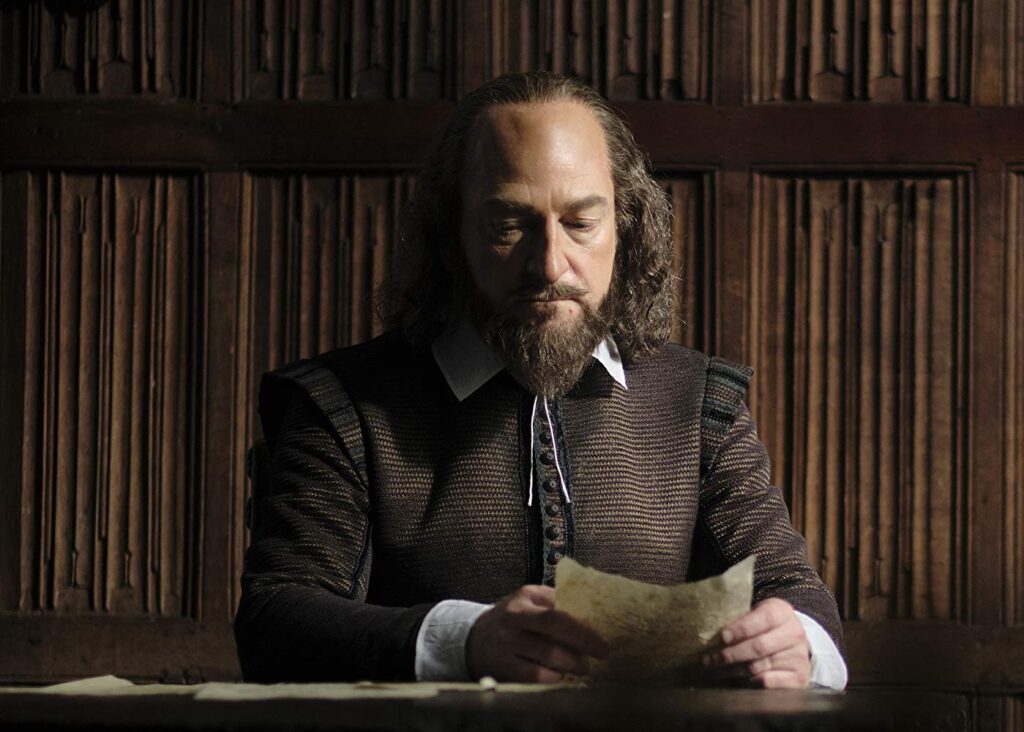You’d be hard-pressed to find a bigger fan of William Shakespeare than Academy Award nominee Kenneth Branagh: for thirty years, he’s been directing (and occasionally starring in) feature film adaptations of Shakespeare’s works, not to mention staging dozens of theatrical productions around the globe. That Branagh should now have an opportunity to portray the Bard himself in All is True, a fictionalized tale about the playwright’s final years screening at the 2019 Phoenix Film Festival, seems only natural.
We first glimpse Will Shakespeare (Branagh) silhouetted against a wall of flame as he watches his beloved Globe Theatre burn to the ground. A prop cannon has misfired during a production of All is True (which would later be retitled Henry VIII), and the most famous theater in London is now a heap of smoldering ash. Will returns home to a sprawling, picturesque estate in Stratford-upon-Avon, content to live out his remaining years trying to reconnect with his wife, Anne (Judi Dench) and two daughters, Susanna (Lydia Wilson) and Judith (Kathryn Wilder).
Unfortunately for Will, his prolonged absence has done little to endear himself to the rest of the family. “To us, you’re a guest,” says Anne, just before shutting the door of the master bedroom and relegating Will to the visitor’s quarters. Judith is bitter that her father continues to mourn his son Hamnet, who died at the age of eleven — he spends most of his days toiling away in a garden that he envisions as a tribute to the boy’s memory — and Susanna is kept mostly out of the picture by her Puritan husband (Hadley Fraser), who frowns upon the perceived sinfulness of her father’s vocation.
Will’s inability to find comfort in the halls of his own home leads to an air of melancholy, and his efforts to find common ground with the family are sorely lacking. “You’ve spent so long putting words in other people’s mouths, you think it only matters what is said,” Anne admonishes, and Will positively withers at her stern rebuke. Dench is wonderful at relaying years of anger and resentment that have finally risen to the surface, yet also signifying the underlying affection for her husband through small gestures, helping Will with his gardening or walking arm-in-arm through the sun-dappled pathways around the estate.
The candlelit interiors of the Shakespeare home could easily have felt dingy, but cinematographer Zac Nicholson imbues them with a warm glow that evokes an ethereal beauty. Even more commendable are the stunning exterior shots of the estate, awash in rich fall colors, shimmering ponds and towering hedges. While Shakespeare’s actual family home was demolished in 1759 — otherwise Branagh would almost certainly have insisted on shooting there — the film postulates a scenic manor in which we can easily imagine the legendary writer residing.

With a prosthetic nose and baldcap, Branagh looks less like the Bard and more like Sir Ben Kingsley, which is a bit distracting until you grow accustomed to it. But whether thundering at his family in a grief-fueled outburst or conversing quietly with the Earl of Southampton (Ian McKellen, spectacular in a mustache flowing blonde wig) during a fireside chat, Branagh’s performance carries exactly the sort of weight you would expect when a lifelong devotee is given a chance to embody his idol. After bringing so much emotion and eloquence to Shakespeare’s characters, his ability to summon those same qualities in the man himself feels almost effortless.
The narrative, regrettably, isn’t up to par with the stellar work of the cast. Ben Elton’s screenplay is nearly devoid of the sharp wit synonymous with his Bard-based British sitcom Upstart Crow: indeed, the Will Shakesepeare of All is True is often meek in the face of adversity, endlessly obsessed with how others view him. There are some moments of greatness, to be sure — the aforementioned encounter with the Earl, whom many scholars believe to have been the inspiration behind Shakespeare’s love sonnets, is a particular highlight — but the throughline of Will trying to make amends for his absence at the time of Hamnet’s death is underwritten, and thus underserved.

